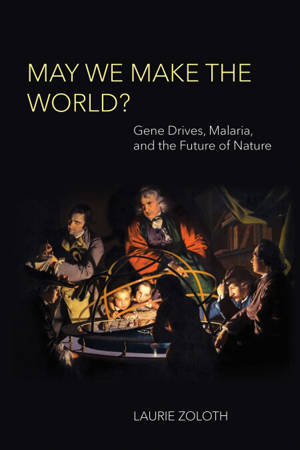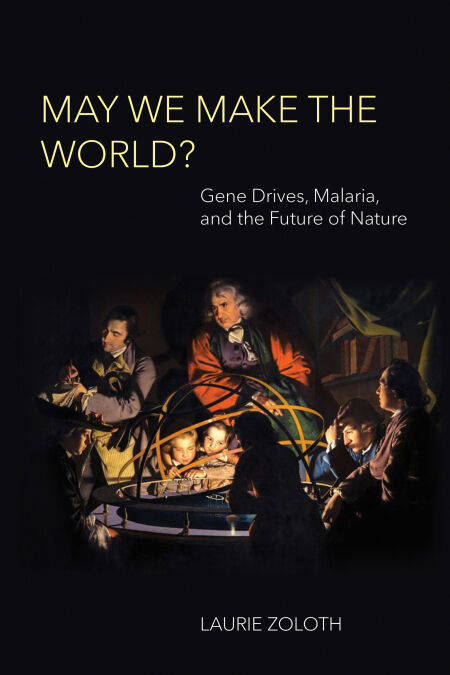
Bedankt voor het vertrouwen het afgelopen jaar! Om jou te bedanken bieden we GRATIS verzending (in België) aan op alles gedurende de hele maand januari.
- Afhalen na 1 uur in een winkel met voorraad
- In januari gratis thuislevering in België
- Ruim aanbod met 7 miljoen producten
Bedankt voor het vertrouwen het afgelopen jaar! Om jou te bedanken bieden we GRATIS verzending (in België) aan op alles gedurende de hele maand januari.
- Afhalen na 1 uur in een winkel met voorraad
- In januari gratis thuislevering in België
- Ruim aanbod met 7 miljoen producten
Zoeken
€ 59,14
+ 59 punten
Omschrijving
An in-depth look at genetic alteration in the natural world and the oppositions to it, seen through the case study of a gene drive for malaria.
May We Make the World? is an engaging reflection on the history, nature, goal, and meaning of using a new technological idea—CRISPR-based genetic engineering—to alter the genome of the mosquito that carries malaria. This technology, called a “gene drive,” can alter the sex ratio in Anopheles gambiae mosquitoes, the key vector for falciparum, the deadliest form of malaria. P. Falciparum kills 400,000 people a year, largely the poorest children in the world among them. In her sobering examination of the issue, Laurie Zoloth considers the leading ethical arguments for and against gene drives, explores the regulatory efforts that have emerged long in advance of the science, and considers the philosophical questions raised by the struggle to eliminate malaria.
The development of a gene drive for malaria will have far-reaching implications for it represents the first use of genetic engineering in the natural world and the first creation of a genetic variant intended to spread in the African wild beyond human control. Drawing on two decades of work, Zoloth brilliantly argues that we can understand the complex moral issues at stake only by carefully reflecting on the science, the nature of the local and global discourse about genetic engineering, and the long history of malaria, which—as it transformed from a worldwide disease to a tropical one—reshaped the world as we know it.
May We Make the World? is an engaging reflection on the history, nature, goal, and meaning of using a new technological idea—CRISPR-based genetic engineering—to alter the genome of the mosquito that carries malaria. This technology, called a “gene drive,” can alter the sex ratio in Anopheles gambiae mosquitoes, the key vector for falciparum, the deadliest form of malaria. P. Falciparum kills 400,000 people a year, largely the poorest children in the world among them. In her sobering examination of the issue, Laurie Zoloth considers the leading ethical arguments for and against gene drives, explores the regulatory efforts that have emerged long in advance of the science, and considers the philosophical questions raised by the struggle to eliminate malaria.
The development of a gene drive for malaria will have far-reaching implications for it represents the first use of genetic engineering in the natural world and the first creation of a genetic variant intended to spread in the African wild beyond human control. Drawing on two decades of work, Zoloth brilliantly argues that we can understand the complex moral issues at stake only by carefully reflecting on the science, the nature of the local and global discourse about genetic engineering, and the long history of malaria, which—as it transformed from a worldwide disease to a tropical one—reshaped the world as we know it.
Specificaties
Betrokkenen
- Auteur(s):
- Uitgeverij:
Inhoud
- Aantal bladzijden:
- 428
- Taal:
- Engels
- Reeks:
Eigenschappen
- Productcode (EAN):
- 9780262377003
- Verschijningsdatum:
- 18/12/2023
- Uitvoering:
- E-book
- Beveiligd met:
- Adobe DRM
- Formaat:
- ePub

Alleen bij Standaard Boekhandel
+ 59 punten op je klantenkaart van Standaard Boekhandel
Beoordelingen
We publiceren alleen reviews die voldoen aan de voorwaarden voor reviews. Bekijk onze voorwaarden voor reviews.









